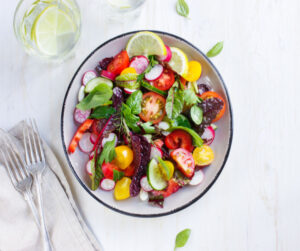Foods That Reduce Alcohol Cravings

This article was written and published by Faith in Recovery
For people recovering from alcoholism, managing alcohol cravings can be a daily struggle, but what you eat can help. The key is to choose foods that improve digestion, promote steady blood sugar throughout the day, or support brain chemistry and cognition. While health digestion optimizes the body’s ability to absorb amino acids, vitamins, and minerals that can reduce cravings, steady blood sugar normalizes hunger-causing hormones, such as insulin and leptin. Additionally, getting enough lean protein contributes to the production of chemicals associated with reward and well-being, such as dopamine and serotonin. If you or someone you know is in recovery from drinking, here are the best foods that reduce alcohol cravings.
Foods That Stop Alcohol Cravings
It’s important to take care of yourself physically while recovering from alcohol abuse. What we eat not only impacts how we feel physically but also our mental health. With that said, eating the right kinds of foods can fortify your mind and body against cravings and help you lead a sober lifestyle with less of a struggle. If you’re looking to improve your recovery, below are seven of the best foods to reduce alcohol cravings.
Brown Rice, Whole Grain Bread, and Pasta
Easy-to-cook foods that help with alcohol cravings include brown rice, whole grain bread, and pasta. Because alcohol contains simple carbs that are quickly digested in the body, the body becomes accustomed to carbs and begins to crave them. If you want to control your cravings for alcohol, incorporate complex carbs like brown rice and 100% whole grain and pasta to get enough energy to curb your cravings and feel fuller longer. This, in turn, will reduce your need for alcohol. Whole-grain foods also contain a lot of fiber, which can help maintain a healthy gut. Alcohol can have a severe impact on the stomach and intestines, so this is a great bonus from eating whole grain foods.
Spinach and Parsley
Raw spinach and parsley provide vitamins, minerals, and fibers to help regulate your metabolism. They also contain L-glutamine, an amino acid that decreases anxiety and cravings. However, it’s important to note that you’ll get the most out of these greens if they’re eaten raw, as L-glutamine is broken down in the cooking process. You can easily add these greens into your diet in salads and sandwiches.
Peanut Butter and Nuts
Peanut butter and other nuts like almonds and Brazil nuts are great foods to help with alcohol cravings. They’re a great source of fiber, vitamin B, healthy fats, and protein, which contain amino acids that are essential for the production of dopamine. Dopamine is a key neurotransmitter linked to mood and the feeling of well-being. Eating foods that spark dopamine production can help you feel more satisfied, reducing dark moods that may otherwise contribute to alcohol cravings and thoughts of drinking.
Salmon, Tuna, and Mackerel
Fish like salmon, tuna, and mackerel are loaded with protein and vitamin D, which have been shown to reduce depression symptoms and stabilize mood. Coldwater fish like salmon and mackerel are especially rich in polyunsaturated fats and are among the best sources of omega-3 fatty acids. Omega-3 fatty acids have been shown to decrease depression, regulate mood, and improve mental clarity and function. All of these benefits, together, can help reduce alcohol cravings.
Plain Organic Yogurt
Other delicious foods that reduce alcohol cravings include plain yogurt. Yogurt not only contains probiotics that support gut health, but it also contains calcium and vitamin D. These vitamins can also be absorbed from whole, soy, and almond milk. Other sources of vitamin D include cheese, fruit, legumes, and dark greens.
Fruit
Fruits like bananas and pineapple can also help to reduce alcohol cravings by spiking dopamine levels. Drinking alcohol can impact dopamine, which may lead to a sense of euphoria, pleasure, and reward. Long-term alcohol abuse can eventually make it difficult for the brain to produce dopamine on its own. As a result, the individual may become dependent on drinking alcohol to feel good. Reduction in dopamine can therefore lead to alcohol cravings, but fruits like bananas and pineapples can contribute to dopamine and serotonin production, improving the individual’s mood and ultimately preventing alcohol relapse. You can either eat these fruits on their own, add them to smoothies, or eat them with yogurt (another recommended food on this list,) granola, or oatmeal.
Walnuts
Walnuts, particularly English walnuts, are packed with protein and omega-3 fatty acids. Many seeds, such as sunflower seeds, are also excellent sources of fiber and antioxidants and can contribute to dopamine production. You can eat a handful of these daily or add them to yogurt, cereal, and salads with leafy greens.